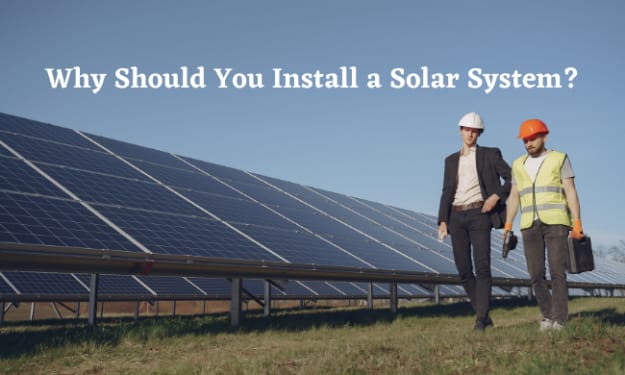Can a House Run on Solar Power Alone?
Solar Power

Whether for financial reasons, ecological causes, or both, getting 100% of your electrical energy from your own renewable energy source is always profitable. It could have a measurable effect on the environment by reducing your carbon footprint. It may also save money in your bank account by providing you with free electrical energy for many years.
Meeting 100% of a house’s energy requirements with solar energy is possible. But there are a few factors to think about.
First, you’ll need to find out how much electricity you utilize and then assess certain limiting factors for your property. These factors include the area you have available for your solar power system—also, typical weather patterns and shading in your property. You will need to decide between off-grid and on-grid, which may influence the need for batteries and the solar panel price.
We’ll take a look at how these factors can impact your solar system. This will provide you with a better idea of how likely you’ll have the ability to power your house entirely with solar energy.
Factors that Affect the Ability to reach 100% Coverage with Solar Energy
To fulfil 100% of your house’s energy needs, your solar installer will first have to determine how much is your energy consumption. The most common way is to look at your previous electricity usage, which is included in your electricity bills.
However, it’ll go beyond reading the latest bill. There are a few factors that a solar installer will have to keep in mind when designing a solar power system that meets all of your energy needs. The amount of electricity you utilize will seemingly vary from month to month and season to season.
In the spring and fall, cold weather could result in lower electricity bills compared to hot summers when the air conditioning is used the most. Your solar installer needs to average how much electricity you usually use to understand how big of a solar system you will need.
Another factor is the weather and climate in your local area. The solar panel production of electrical energy in sunny areas over a year is different from a solar panel production in cloudy or rainy regions.
No matter where you reside, the quantity of electrical energy your solar system generates in the summer will be much higher than in the winters, due to more daylight hours. Solar installers will have a look at average weather patterns in your area to get a correct estimate of how much electrical energy you’ll be able to generate throughout the year.
Solar panels should be installed in a bright, sunny spot. To install a solar system that may fulfil 100% of your house’s electrical energy needs, you should be located in an area where your solar panel receives maximum sunlight.
Not all roofs are created equal. If your house is south-facing, it will receive much less sun throughout the day, so you’ll need to install extra solar panels to make up for the loss in solar panel production. If there are trees around your property that cast shade on your roof all through the day, they might need to be trimmed or removed. Many other obstructions like nearby buildings, chimneys, and even exhaust fans can even impact solar panel production.
One of the major advantages of a ground-mounted solar system is, it can be positioned in the ideal direction and tilt for solar panel production. That is one thing that will not be possible with a roof mount.
If your aim is a 100% solar-powered house, you can obtain it with an off-grid or grid-tied solar system. The only difference between these two is what happens to your extra electricity and how you access electricity when your solar system is not producing energy.
On overcast days, rainy climates, or through the night-time, your system won’t produce more electrical energy; however, you’ll still need to make use of it. Solar can still provide you with electrical energy on these occasions by producing extra electrical energy during the sunny periods and that extra electricity is stored in your batteries, in the case of off-grid systems, or it’s transferred back to the electricity grid in exchange for a credit score if you opt for a grid-tied system.
An off-grid solar system is entirely independent of the utility grid. Which means your house won’t be able to draw energy from the utility grid. -However, opting for the off-grid system can be expensive. At the same time, solar batteries continue to come down in price. You’ll be aware of how much solar energy you’re utilizing and how much energy your solar system can store.
With an on-grid solar system, you will be able to generate 100% of the electrical energy your house uses, however, without the need to purchase batteries to store extra energy.
Many states require utility companies to provide net metering or another compensation method for the electrical energy generated by your solar system that’s added to the grid. With net metering, you’ll get a kilowatt-hour credit for each kilowatt-hour you’ve transferred to the grid. You may then use this credit to pay for any electricity you draw from the grid while your solar system is not producing.
For many homeowners, 100% coverage using solar power is a reasonable goal. So as long as your property is suitable for the size of solar system you want, you should be able to offset your energy usage with solar completely.
When you’re ready to see if solar power is best for you, click the request a quote button beneath. AYKA Solar will provide you with the best solar products at the best prices to get you maximum solar panel savings. Contact us today and achieve a $0 bill with solar.





Comments
There are no comments for this story
Be the first to respond and start the conversation.